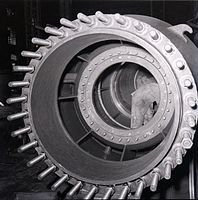
Photo from wikipedia
Abstract Utilizing various wastes in ceramic production has been growing worldwide. This work provides an extensive literature review on the utilization of food, agricultural, and industrial wastes as pore-forming agents… Click to show full abstract
Abstract Utilizing various wastes in ceramic production has been growing worldwide. This work provides an extensive literature review on the utilization of food, agricultural, and industrial wastes as pore-forming agents (PFAs) in porous ceramic production. The literature conducted since 2010 indicates that waste-based porous ceramics has versatile properties with excellent performances. Determination of waste material and clay properties as well as processing conditions such as material composition, sintering temperature, and compaction pressure, which influence pore formation in ceramics, has been comprehensively provided. These factors significantly influence the properties of the resulting porous ceramics, including physical, mechanical, and toxicity properties. Recycling food, agricultural, and industrial wastes for increased energy saving and green ceramic production can be realized as an economical and practical approach to sustainable waste management, which align well with achieving sustainability in a circular economy and the UNESCO’s Sustainability Development Goals (SDG). Achieving zero food, agricultural, and industrial wastes can eliminate environmental burdens and pave the way for closed-loop production. In overall, the waste-based porous ceramics can pave the way for sustainable environments, expanding the economic sector, particularly alternative building materials.
Journal Title: Journal of Cleaner Production
Year Published: 2021
Link to full text (if available)
Share on Social Media: Sign Up to like & get
recommendations!